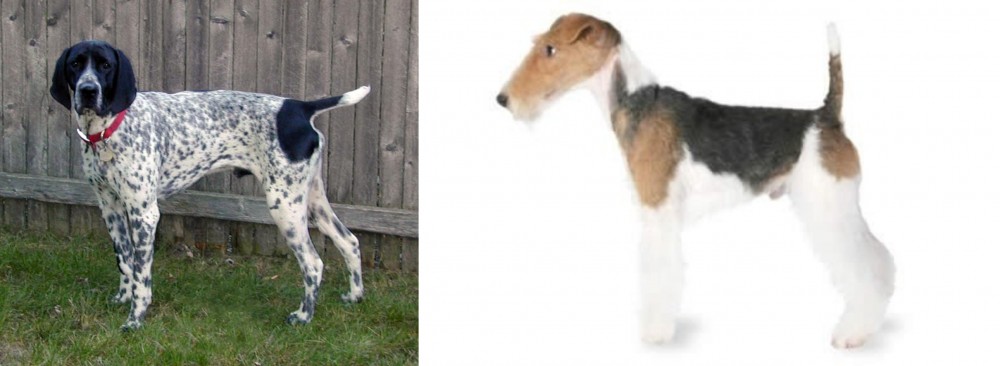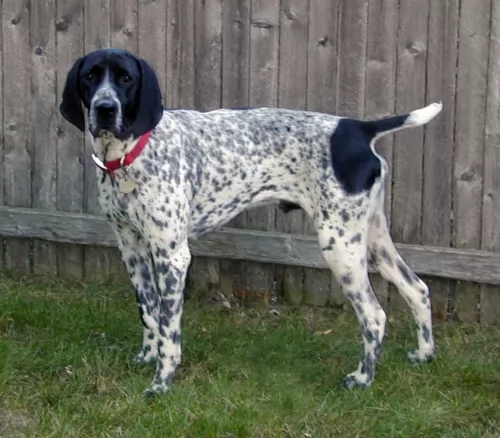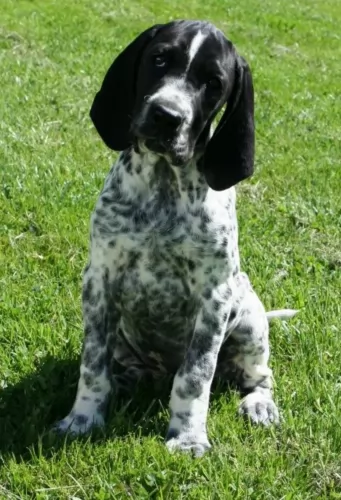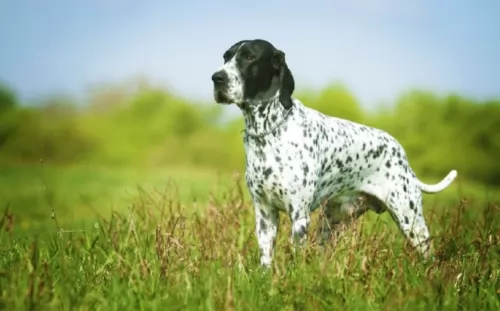 Petzlover
Petzlover Braque d'Auvergne is originated from France but Fox Terrier is originated from United Kingdom. Braque d'Auvergne may grow 26 cm / 11 inches higher than Fox Terrier. Braque d'Auvergne may weigh 53 kg / 117 pounds more than Fox Terrier. Both Braque d'Auvergne and Fox Terrier has same life span. Braque d'Auvergne may have more litter size than Fox Terrier. Both Braque d'Auvergne and Fox Terrier requires Low Maintenance.
Braque d'Auvergne is originated from France but Fox Terrier is originated from United Kingdom. Braque d'Auvergne may grow 26 cm / 11 inches higher than Fox Terrier. Braque d'Auvergne may weigh 53 kg / 117 pounds more than Fox Terrier. Both Braque d'Auvergne and Fox Terrier has same life span. Braque d'Auvergne may have more litter size than Fox Terrier. Both Braque d'Auvergne and Fox Terrier requires Low Maintenance.
 Sometime over 5 centuries ago, in the Cantal Region of France, was born a hunting breed, that might be the real ancestor of today’s pointing hunter dogs. Perhaps the oldest of all pointing gun dog is the Braque d’Auvergne. This breed comes from Central France in the region of Auvergne. This breed was developed prior to written dog breeding records in order to hunt in this region and find, point, flush out and retrieve fowl. This breed is clearly one of if not the oldest breeds in the French Braque. There is no agreement among historians on what breed is the oldest of the European pointing dogs and where they were developed – was it Spain or was it France? It is thought that the Braque Francais Gascogne is the original one of these in the early 1600’s while the Braque d’Auvergne came soon after. Due to the different hunting needs in the different parts of France, the Braque Francais Gascogne was crossed with a lot of other local scent hounds. The Braque d’Auvergne is one of the very oldest of all of these. There are records of the breeds existence in the 1700’s. It is probable that the Braque d’Auvergne was developed by crossing local dogs with Gascogne as well as with the Petit Bleu de Gascogne and the Grand Bleu de Gascogne.
Sometime over 5 centuries ago, in the Cantal Region of France, was born a hunting breed, that might be the real ancestor of today’s pointing hunter dogs. Perhaps the oldest of all pointing gun dog is the Braque d’Auvergne. This breed comes from Central France in the region of Auvergne. This breed was developed prior to written dog breeding records in order to hunt in this region and find, point, flush out and retrieve fowl. This breed is clearly one of if not the oldest breeds in the French Braque. There is no agreement among historians on what breed is the oldest of the European pointing dogs and where they were developed – was it Spain or was it France? It is thought that the Braque Francais Gascogne is the original one of these in the early 1600’s while the Braque d’Auvergne came soon after. Due to the different hunting needs in the different parts of France, the Braque Francais Gascogne was crossed with a lot of other local scent hounds. The Braque d’Auvergne is one of the very oldest of all of these. There are records of the breeds existence in the 1700’s. It is probable that the Braque d’Auvergne was developed by crossing local dogs with Gascogne as well as with the Petit Bleu de Gascogne and the Grand Bleu de Gascogne.
In all of Western Europe, the region of Auvergne is not very populated and has unique geography in that is hilly and has many extinct and eroded volcanoes. A lot of the region is still unpopulated. In this environment, wildlife has flourished, and hunting is successful in providing food for the regions people. This circumstance with an abundance of birds, led to the breeding of the Braque Auvergne to specialize in hunting in this area. The breed is not very popular outside of Auvergne and probably never was. That fact allowed them to be devastated by the Second World War. The Reunion des Amateurs de Braque d’Auvergne (RABA) was started to promote the pure breeding and the protection of the d’Auvergnes. But when Auvergnes was occupied during the war, the slowed breeding of the Braque d ‘ Auvergne almost eliminated the breed. There might have only been about 25 dogs left following the end of the war. These remaining dogs were used to revive the breed, but it is still uncommon, but not rare. Individuals have been imported by other countries including North America. The United Kennel Club (UKC) accepted the breed in 2006 but is not accepted by the AKC (American Kennel Club). The breed is still a working breed and outside of France, very rare.
 The Wirehaired Fox Terrier and the Smooth Fox Terrier were for over 100 years the same breed of dog. Now it is believed that they are two separate breeds with two separate ancestry. It is an English creation with Dachshunds, Fox Hound, English Hounds, and Beagle in their background. It is also believed that the Wales, Durham and Derbyshire extinct rough-coated black and tan working terrier. The white terrier breeds that exist today are related to the Fox Terrier. In addition, it is recognized that terrier breeds of today such as the Jack Russel, the Rat Terrier, and the Miniature Fox Terrier are descendants of the Fox Terrier.
The Wirehaired Fox Terrier and the Smooth Fox Terrier were for over 100 years the same breed of dog. Now it is believed that they are two separate breeds with two separate ancestry. It is an English creation with Dachshunds, Fox Hound, English Hounds, and Beagle in their background. It is also believed that the Wales, Durham and Derbyshire extinct rough-coated black and tan working terrier. The white terrier breeds that exist today are related to the Fox Terrier. In addition, it is recognized that terrier breeds of today such as the Jack Russel, the Rat Terrier, and the Miniature Fox Terrier are descendants of the Fox Terrier.
They are one of the oldest of the terrier breeds dating back to the 17tth century in the British Isles. They were primarily farm dogs guarding against the fox and vermin. Like any terrier they go to ground – digging, growling, barking and lunging at the den until the animal comes out and the farmer killed it. The breed was made popular in England through their living with royalty. The Nots Kennel had a lot to do with this as well. King Edward VII’ Wire Fox Terrier came from the Notts Kennel. The Best Champion of Crufts in 1911 was a Wire Fox Terrier, and Queen Victoria had one as well. The Wire Fox Terrier finally became a family dog in the 1930’s. During this time there were feature movies and comic strips that feature a Wire Fox Terrier, such as The Thin Man and The Adventures of Tintin.
The late 1900’s saw the population moving off the farms, out of the country and into the cities. This caused a decline in the popularity of the breed. Keeping terriers born to hunt in the city proved a challenge in the beginning. Their popularity is influenced as well by the breeds success in the prestigious Westminster Kennel Club Dog Show in New York – second only to the Crufts Dog Show in England. Adding to their early success at Crufts, the Wirehaired Fox Terrier breed has won more Westminster Best in Show than any other with 14. Only five dogs have won at Westminster more than once and one of those is a Wirehaired Fox Terrier. A Smooth Fox Terrier won it three times.
 The Braque d’Auvergne is a well built, strong hunting dog with long ears, a large head and a docked tail. His coat is white with black markings and black ears and head. The breed looks a lot like all the other pointing dogs from France. They are medium in stature and has the appearance of a working gundog. He is athletic, muscular and fit. Docking the tail is outlawed in many countries and all of the United Kingdom. In that case the tail is high on the rump and always straight. Their face and head are big for the size of the body and shaped like an oval. With a long muzzle, deep set eyes and a gentle expression, they are kindly and handsome dogs. Their skin is loose but not droopy or wrinkled like hound dogs.
The Braque d’Auvergne is a well built, strong hunting dog with long ears, a large head and a docked tail. His coat is white with black markings and black ears and head. The breed looks a lot like all the other pointing dogs from France. They are medium in stature and has the appearance of a working gundog. He is athletic, muscular and fit. Docking the tail is outlawed in many countries and all of the United Kingdom. In that case the tail is high on the rump and always straight. Their face and head are big for the size of the body and shaped like an oval. With a long muzzle, deep set eyes and a gentle expression, they are kindly and handsome dogs. Their skin is loose but not droopy or wrinkled like hound dogs.
 The Wirehaired Fox terrier is a sturdy dog with features quite similar to the Smooth Fox Terrier. It is symmetrical with a short back, round, dark eyes, a body that is shorter and ears that are v-shaped. He is medium sized with a flat skull that narrows as it approaches the nose. The nose is black, and the muzzle also tapers to it. The breed has a high, docked tail outside the United Kingdom. The tail is natural in the United Kingdom. They don’t have a broad or narrow chest, but it is deep. Laid back shoulders and a short back are signs of good breeding. Their legs are strong, and their feet have tough, cushioned pads.
The Wirehaired Fox terrier is a sturdy dog with features quite similar to the Smooth Fox Terrier. It is symmetrical with a short back, round, dark eyes, a body that is shorter and ears that are v-shaped. He is medium sized with a flat skull that narrows as it approaches the nose. The nose is black, and the muzzle also tapers to it. The breed has a high, docked tail outside the United Kingdom. The tail is natural in the United Kingdom. They don’t have a broad or narrow chest, but it is deep. Laid back shoulders and a short back are signs of good breeding. Their legs are strong, and their feet have tough, cushioned pads.
 This is a gentle, adaptable and obedient breed. With their intelligence and affectionate nature, they make great family dogs and are eager to please their people. Living with other dogs is fine but not with small, prey size animals. The Braque d’Auvergne should never be left alone pets like gerbils and hamsters. They must be socialized to cats as pets and not prey before living with them successfully. They need to work closely with one human partner. They are first and foremost a hunting dog and need some sort of hunting simulation. They are devoted to their families and want to be constantly in their presence. This can lead to separation anxiety if they are left alone too much. They are great with children and need a family.
This is a gentle, adaptable and obedient breed. With their intelligence and affectionate nature, they make great family dogs and are eager to please their people. Living with other dogs is fine but not with small, prey size animals. The Braque d’Auvergne should never be left alone pets like gerbils and hamsters. They must be socialized to cats as pets and not prey before living with them successfully. They need to work closely with one human partner. They are first and foremost a hunting dog and need some sort of hunting simulation. They are devoted to their families and want to be constantly in their presence. This can lead to separation anxiety if they are left alone too much. They are great with children and need a family.
 The Wirehaired Fox Terrier is good with children but if teased and frustrated he could bite. Children should know how to play with them and not to tease them.
The Wirehaired Fox Terrier is good with children but if teased and frustrated he could bite. Children should know how to play with them and not to tease them.
He is great at performing tricks, tracking, agility, watch dog, competitive hunting or field trials.
The Wirehaired Fox Terrier is quite adaptable and can live anywhere. He is not a big dog but remember he is very high energy.
The breed is very smart but being independent thinkers, they can be difficult to train at times. Consistency and patience are needed when training the Wirehaired Fox Terrier. They get bored easily and if training sessions are not fun you will lose them. This is a breed that loves people but need constant supervision and companionship.
 The Braque d’Auvergne is a healthy breed but can face some of the same health concerns as other pointers and hunting dogs. The long, droopy ears can get infected easily if wet and need to be cleaned regularly so that food or dirt are not trapped their either. Because of the small gene pool however they may be at risk for several issues. The breeders in France express concerns about possible hip dysplasia and testing is highly recommended. Because they are at risk for other conditions that might not show up until later in life, it is also recommended that they be tested by the Canine Eye Registration Foundation (CERF) as well as the Orthopedic Foundation for Animals (OFA).
The Braque d’Auvergne is a healthy breed but can face some of the same health concerns as other pointers and hunting dogs. The long, droopy ears can get infected easily if wet and need to be cleaned regularly so that food or dirt are not trapped their either. Because of the small gene pool however they may be at risk for several issues. The breeders in France express concerns about possible hip dysplasia and testing is highly recommended. Because they are at risk for other conditions that might not show up until later in life, it is also recommended that they be tested by the Canine Eye Registration Foundation (CERF) as well as the Orthopedic Foundation for Animals (OFA).
 This is basically a healthy breed, but there are some potential issues that could arise:
This is basically a healthy breed, but there are some potential issues that could arise:
This is possible in white terriers
 The Braque d’Auvergne needs a high-quality diet fit for a working dog but not too much to make him obese. They are an active breed to choose a formula that is designed for working dogs.
The Braque d’Auvergne needs a high-quality diet fit for a working dog but not too much to make him obese. They are an active breed to choose a formula that is designed for working dogs.
Although no studies have been conducted on the Braque d’Auvergne’s health issues there are many conditions that similar breeds are susceptible to and the d’Auvergne might be as well. This includes any of the following:
This is an active, working dog who needs a lot of stimulation and exercise. The only real appropriate exercise for these dogs is hunting or outings in the woods. He not only needs the exercise, but he also needs to stimulate his sense of smell and his gundog intelligence. He might excel in lure chase or even a form or barn hunt. They certainly could excel at obedience trials and perhaps rally. If you are a weekend hunter then this is the ideal dog for you. They are so easy to train that they surpass other pointers for success with casual hunters. They hunt at a slower pace than many other gundogs. Their intelligence and athleticism lend itself well to agility and flyball also. They need a large (+acres)fenced in area to run and play.
 Give them two meals maybe three per day. Total food per day divided into the number of meals is 1/8-1/4 cup day.
Give them two meals maybe three per day. Total food per day divided into the number of meals is 1/8-1/4 cup day.
Once again feed one-two meals per day and don’t overfeed. Total of ½ cup day
Being a terrier, the Wirehaired Fox Terrier needs a lot of exercise. He is energetic and playful. He loves to play ball, take interesting walks, and play in fenced areas. He needs to be in either a fenced area or on a leash as he will chase any small animal that he sees moving. But if you leave him unsupervised in a fenced area, don’t forget he is a terrier. He is likely to dig under or climb over a fence that isn’t entirely secure.
He loves earth dog trials, agility, tracking, hunting, flyball, and running. He hardly ever walks. He can play ball chasing for hours if you let him. Exercise is bonding for you and your Wirehaired Fox Terrier.